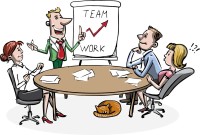- Home
- Business Processes
- Industry Knowledge
- Aerospace Industry
- Automotive Industry
- Banking Domain
- BFSI Industry
- Consumer/ FMCG Industry
- Chemicals Industry
- Engineering & Construction
- Energy Industry
- Education Domain
- Finance Domain
- Hospitality Domain
- Healthcare Industry
- Insurance Domain
- Retail Industry
- Travel and Tourism Domain
- Telecom Industry
- Leadership Skills
- eLearning
- Home
- Leadership
- Communication Skills
- Time Management Skills
Time Management Skills
How often do you have a plan for how you are going to spend your day but you aren't able to complete the tasks on your plan because of unimportant tasks, interruptions, or your own procrastination? Wouldn't it be great to be able to manage your schedule and your time while avoiding, or at least controlling, these time stealers? Learn the strategies to manage your schedule while still handling interruptions and demands on your time.
Meaning of Time
What time means to you and how to identify some of the ways in which you can manage it more effectively?
If you wish to become an effective manager of time you must first understand the nature of what you are attempting to manage. Time in this context is not to be defined philosophically. Most simply, it is of finite duration distinct from eternity. The expression 'time' in the English language as well as in other languages is used in different ways. Spend a few minutes writing down some ideas of what the following phrases mean to you:
- At the same time
- On-time
- Time off
- At times
- From time to time
- Timeless
- In no time
- Timely
- In time
A reflection on the above phrases will enable you to focus on the nuances of meaning that underpin their use in actual contexts. You have probably now got a clearer idea of time. Time in fact is an intangible concept or a paradox. You never have enough time but you have all the time that is available. It is a resource, but if you don't use it, it will disappear and you will never be able to catch hold of it, once gone. You can't increase its quantity, but you can ensure that you use it on things that are important to you.
You might have realized that time is a personal concept which means there is no right or wrong perception of time. Learning to manage time requires commitment and depends on how you approach various activities. Your approach will be influenced by the assumption you make about the nature of your work and the environment in which you live and work. Some assumptions will generally be more useful than others for managing your time effectively.
Meaning of Time Management
One of the most essential skills required by an effective manager and every professional relates to managing the time available and prioritize the long term and short-term goals.
Time management is a process of determining the quality and quantity of work output i.e. the effective utilization of time in performing various activities in the organization. Time management is the discipline of organizing, allocating, and controlling the time you use for activities in such a way that you achieve your desired results.
You as an employee have to perform your activities according to your job description. Your important duty is to see that all the activities are performed as per the job description and with the time limit assigned to the job. Time management will help you to perform your job more effectively and efficiently.
The flow of Time is Unidirectional
Like other resources, 'time' is also an important resource that has got a unique character of having a constant unidirectional forward flow. Time passed, cannot be regenerated nor it can be stored to be utilized later on when needed.
Adequate input of all other resources does not necessarily guarantee achievement up to expectation, if during the planning and implementing all possible efforts were not undertaken to complete the various component tasks in targeted time by effectively utilizing the same.
Why Time Management?
Time management is the discipline of organizing, allocating, and controlling the time you use for activities in such a way that you achieve your desired results. Time is a very valuable resource. The first step towards improving time utilization is to determine how available time is spent on different types of activities. Although managers understand that time is their scarcest resource, few actually take time to get a ‘birds-eye’ view of how they actually spend their time and keep a track of how the priorities they say are the most important fit with the actual way they spend their time. It highlights how to control your time so that you can optimize your productivity. Time management helps us to:
- To provide quality time to your responsibilities
- To decrease expenses through work transformation
- To see that all the staff spends their time as per the activities listed in their job description
- To measure the work output and facilitate quality customer focus
Time management is simply a way of using time effectively. Working faster or working longer are poor strategies for managing time. It is more sensible to identify your priorities and then choose the activities accordingly. In fact managing time is about managing yourself. It is about adapting to a given situation so that you can get the most out of your time for you to do this, you must accept that you can influence and ultimately control the environment in which you live and work. You must learn to spend your time wisely.
Related Links
You May Also Like
-
Building Perfect Creative Team
One misconception around creativity is that creative act is essentially solitary. Most of the world's important inventions resulted not from the work of one lone genius, but from collaboration of a team with complementary skills. Managers should build teams with the ideal mix of traits to form a creative group and then establish the conditions that make creativity much more likely to occur.
-
Collaborative leadership is all about collaborative problem-solving and decision-making or can also be defined as the leadership of a collaborative effort. . The term started to appear in the mid-1990s in response to the formation of long term public-private partnerships to rebuild public infrastructure. Learn how you can use principles of collaborative leadership to enhance your leadership skills for being an effective leader.
-
Teams are certainly very relevant and important elements in today’s high-performance organization but the important thing to remember as a leader is that we can’t simply rely on putting highly effective individuals together to make a highly effective team. Empowerment increases the effectiveness of the team and drives many intangible benefits both for the organization and the employees.
-
Authentic leadership is an approach to leadership that emphasizes building the leader's legitimacy through honest relationships with followers which value their input and are built on an ethical foundation. The authentic leader acts upon his or her values and beliefs, and inspires others to do the same, is committed to know and develop oneself. Are you committed to developing yourself; know your motivations and the purpose of your leadership? Read this article to know more about authentic leadership style and discovering your authentic self.
-
Recognizing Stress & its Sources
As an individual, you almost certainly know what stress feels like. Stressors are events or situations to which people must adjust. Stressors may be physical or psychological in nature. The level of severity of stress is determined not merely by exposure but the intensity, duration, and frequency of stressors. The sources of stress are many. They arise from multiple areas both with the individual and from the environment.
-
Facilitative Leadership is all about involving the employees in the decision-making process at all levels enhancing their sense of ownership, responsibility, and motivation. Facilitative leadership style uses a number of indirect communication patterns to help the group reach consensus and build commitment for the decision taken. To be effective in modern organizations, managers need to become facilitative leaders, learn what it means to be a one.
-
Charisma is a certain quality of an individual personality, by virtue of which he is set apart from ordinary men. Charismatic Leader gathers followers, through dint of personality and charm. Understand the meaning and concept of Charismatic Leadership and the qualities of a charismatic leader. Gain an understanding of the advantages and disadvantages of using charismatic leadership. Finally, explore the difference between charismatic and transformational leadership.
-
Appreciative leaders encourage contributions from those around them and facilitate the discussion to mutually solve problems. Understand the concept of Appreciative Leadership and learn about tools to create and ask powerful questions - that lead to new discoveries and possibilities. Instead of focusing on what’s wrong in the workplace, learn about, and build upon what works. Learn in this article the art to apply appreciative inquiry to specific situations and challenges at your workplace.
-
“Level 5 Leadership”, this term was coined by Jim Collins in his book “Good to Great” and it is all about achieving "Greatness" as a leader. This article will explain what we mean by Level 5 Leadership and what the characteristics of a Level 5 leader are. What it takes to achieve greatness as a leader, and what are the steps and strategies that one can use to move up to this top level of leadership.
-
Storming Stage of Team Development
Storming is the second stage of team development and this stage is characterized by a bid for power and inter-personal conflicts. Learn the key factors that occur in the storming stage and the strategies that a team leader can adopt to pass this stage of high winds
Explore Our Free Training Articles or
Sign Up to Start With Our eLearning Courses

About Us
Learning
© 2023 TechnoFunc, All Rights Reserved










